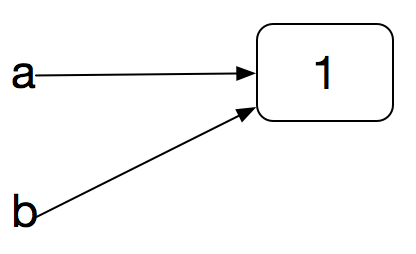Python基础02 变量
Python中的变量有两个特点:
1. 无需声明
a = 1
2. 不与类型绑定
a = 1 a = 'hello world'
变量名只是内存中具体对象的一个引用(reference)。
对于 a = 1,内存模型如下:

对于
a = 1
b = a
内存模型如下:

可以通过id(x)获取变量x所引用对象的内存地址
a = 1 b = a print('address of the object referenced by a:', id(a)) print('address of the object referenced by b:', id(a))
输出如下:
address of the object referenced by a: 4415551552
address of the object referenced by b: 4415551552
对于Python中的list,list的每个元素都是一个引用。
mylist = [1, 2, 3] print('address of the object referenced by mylist:', id(mylist)) for index, item in enumerate(mylist): print('address of the object referenced by mylist[{}]: {}'.format(index, id(item)))
输出:
address of the object referenced by mylist: 4350869128
address of the object referenced by mylist[0]: 4345657408
address of the object referenced by mylist[1]: 4345657440
address of the object referenced by mylist[2]: 4345657472
内存模型如下:

对于Python中函数的参数,也只是对传递进来的变量所引用对象的一个引用。




 浙公网安备 33010602011771号
浙公网安备 33010602011771号